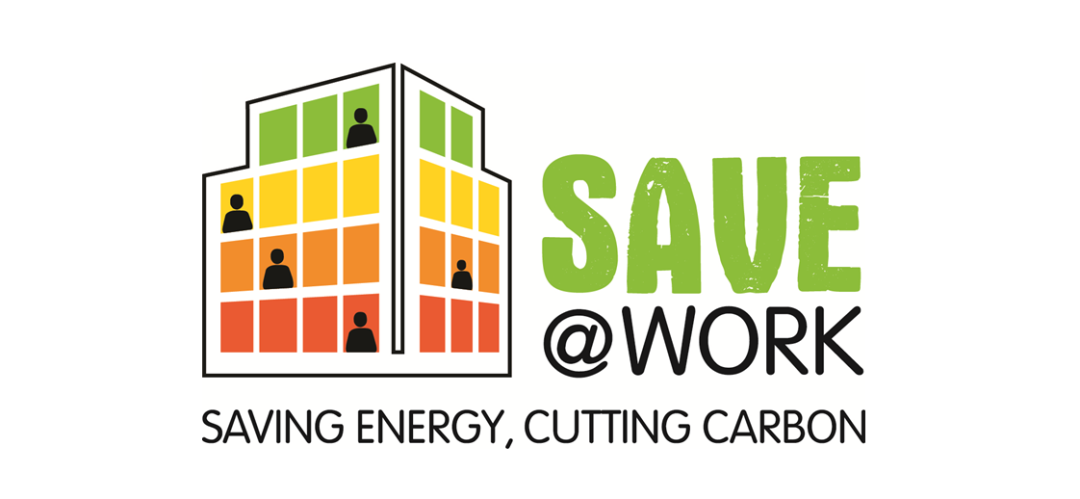
In September the save@work project was concluded in the 9 participating European countries. During the project, altogether 176 public buildings in Europe participated in an energy saving campaign and competition. The research-based methodology of the project considered the theory of interpersonal behaviour, combined top-down and bottom-up approaches and recognized the importance of groups and community building. Energy was saved through changing everyday behaviour and practices. 73% of all participating managed to reduce their energy consumption on average by 8% during the campaign year. However, the most successful buildings reached a much higher saving: the winning Belgian municipality saved 25% energy.
Final award event in Brussels, June 2017
In addition to saving energy it is important to expose the role and significance of the project in raising the awareness of employees and establishing new energy efficient behaviour and practices that can serve as the basis for future sustainable energy activities. save@work contributed to developing more knowledgeable and skilful, as well as more cohesive, employee communities that are ready to focus on making even more energy savings - an outcome that is as important as the savings achieved.
Evaluation has been an integral part of the save@work project both for internal learning and for sharing its outcomes to facilitate the development of successful behaviour change project. It included the following elements:
• pre- and post-campaign participant surveys filled in by 2965 (17%) and 2059 (12%) employees respectively;
• partner self-evaluation surveys (mid-term and final);
• partner interviews and discussions organized partly by a party external to the project consortium; and
• best campaign surveys conducted with local implementation teams (i.e. Energy Teams).
The Evaluation Report provides a summary of information and outcomes gained through all these methods, and based on them puts forward recommendations for future projects, including practical tips for the various stages and components of a behaviour change based intervention programme or campaign. The main elements of the recommendations are as follows:
• Integrate sustainable energy use behaviour into everyday activities and processes, and thus make it the norm that everyone strives to achieve as part of their work.
Integration, however, should not mean that no special and/or additional activities, training, events, etc. are needed to achieve sustainable energy use.
• Build cohesive groups and employee communities to support integration and sustainable energy use behaviour becoming the norm. In addition to supporting and maintaining more sustainable (energy use) behaviour and practices, small groups and communities are also a source of enjoyment, fun and learning.
Group building was an important element of the save@work campaign
• Know what you want to change: in order to be able to know whether efforts to change energy use behaviour and to reduce consumption are successful, we need access to historical and current energy consumption as well as on behaviour, practices, skills, knowledge and infrastructure specific to local contexts, and supporting or hindering sustainable energy use.
• Change and learning new things can be enjoyable: changing routine and habitual behaviour and practices poses challenges. Thus, connecting the necessity for change and learning new things with enjoyment, increasing comfort and well-being is important. Participants in the save@work project acknowledged the existence of this connection: learning new things and becoming more aware were important motivations for joining the campaign as well as important sources for enjoyment.
• Recognize and build on diversity: in a European campaign it is important to follow a shared timeline, structure and content. However, it is just as important to allow for flexibility thus provide methods and tools tailored to local contexts and circumstances. This should be seen as an opportunity for learning and sharing, and campaigns should include opportunities to reflect and build on the resulting diversity. Self-evaluation methods proved helpful in save@work for recognizing and appreciating diversity.
You can find more details about these points as well as the outcomes of the evaluation in the following documents:
• Summary Findings of the Evaluation Report,
• save@work Evaluation Report (full report),
• ppt summary of the Evaluation Report
Edina Vadovics, GreenDependent Institute
The homepage of the save@work project with more news and materials: www.saveatwork.eu
The summary European brochure about the project and its results is available from HERE.